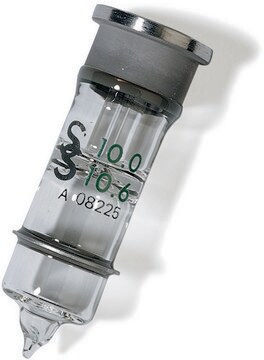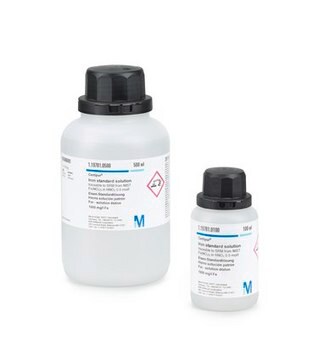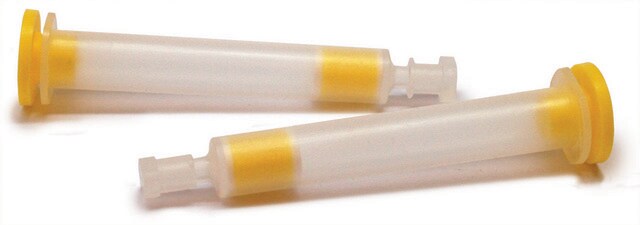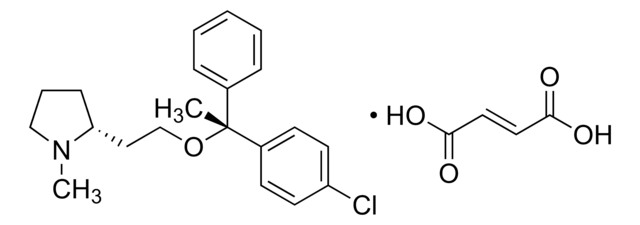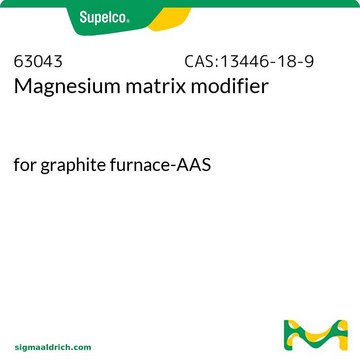23129-U
PID Lamp
Model 108-BTEX, diam. 0.781 in., potential 10.0/10.6 eV
, krypton bulb gas
Iniciar sesiónpara Ver la Fijación de precios por contrato y de la organización
About This Item
UNSPSC Code:
12000000
NACRES:
SB.54
Productos recomendados
material
krypton
diam.
0.781 in.
¿Está buscando productos similares? Visita Guía de comparación de productos
Categorías relacionadas
General description
Photoionization detector is suitable to detect and measure the presence of organic vapours. PID lamps emit ultraviolet light to ionize organic vapour molecules. During ionization, free electrons are generated which produce a current proportional to the number of ions present and resulting signal is interpreted as total organic vapour concentration. The most popular PID lamp is the 10.2-eV which has the highest photon flux hence has high sensitivity.
We offer high quality PID lamps manufactured by Andrews Glass Co.
Model 108 is the most commonly used PID lamp. The 0.781 in. (1.98 cm) base diameter is compatible with OI Model 4430, Tracor, and Baseline photoionization detectors.
Model 103C is the original PID lamp (developed by Scientific Services Co). The 1.375 in. (3.49 cm) base diameter is compatible with HNU and SRI detectors.
Model 108 is the most commonly used PID lamp. The 0.781 in. (1.98 cm) base diameter is compatible with OI Model 4430, Tracor, and Baseline photoionization detectors.
Model 103C is the original PID lamp (developed by Scientific Services Co). The 1.375 in. (3.49 cm) base diameter is compatible with HNU and SRI detectors.
Application
PID lamp 10.6eV may be used for determination of volatile organic compounds in atmosphere in grab sampling and in situ analysis using Portable Gas Chromatography.
Features and Benefits
The PID lamp model 108-BTEX offers:
- 33% more enrgizing radiation than the Model 108 lamp, making it more responsive to BTEX molecules
- Excellent long term output stablity; less frequent recalibration required
- After 3months of continous operation at 1 ma and 250 degrees Celsius, the BTEX lamp has a higher output than a new and unused Model 108
- After 6 months of continous operation at the above conditions, the BTEX lamp has an output better than 50% of its initial output.
Elija entre una de las versiones más recientes:
Certificados de análisis (COA)
Lot/Batch Number
Lo sentimos, en este momento no disponemos de COAs para este producto en línea.
Si necesita más asistencia, póngase en contacto con Atención al cliente
¿Ya tiene este producto?
Encuentre la documentación para los productos que ha comprado recientemente en la Biblioteca de documentos.
Hubert Lobo, Jose V. Bonilla
Handbook of Plastics Analysis, 371-371 (2003)
Determination of volatile organic compounds in the atmosphere using two complementary analysis techniques.
Alonso, L., et al.
Journal of the Air & Waste Management Association (1995), 49, 916-924 (1999)
Nuestro equipo de científicos tiene experiencia en todas las áreas de investigación: Ciencias de la vida, Ciencia de los materiales, Síntesis química, Cromatografía, Analítica y muchas otras.
Póngase en contacto con el Servicio técnico